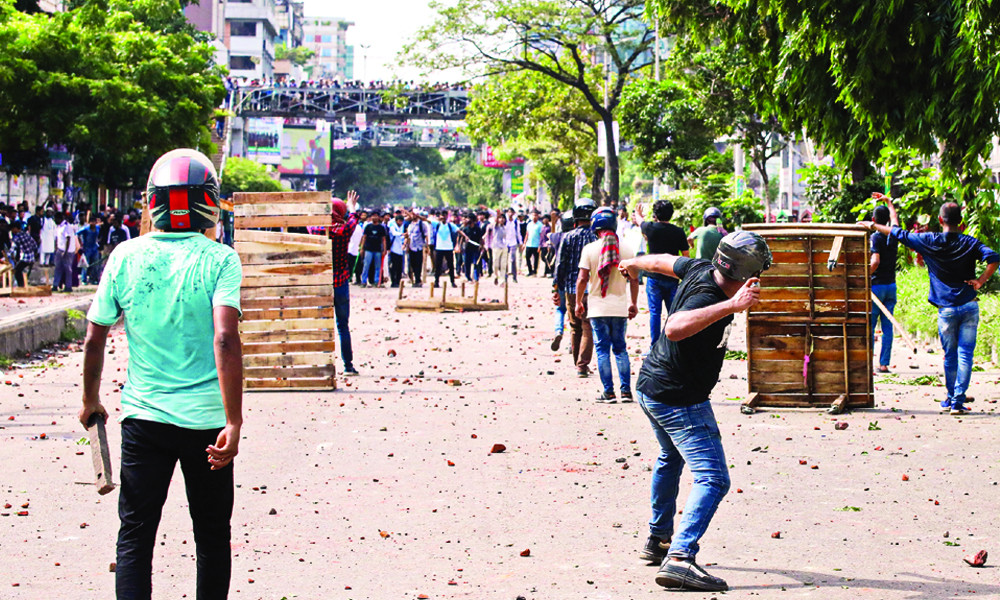Six dead in student protests in Bangladesh: universities closed
Demonstrations over the controversial quota system have mobilised thousands of young people, angered also by the prime minister who referred to them as “razakar", i.e. Bangladeshis who collaborated with Pakistan in 1971. Six people die in violent clashes with police and the Awami League’s student wing. Christian leaders back quotas to protect the most marginalised, but acknowledge they can be reformed.
Dhaka (AsiaNews) – At least six people have been killed – two in Dhaka, three in Chittagong and one in Rangpur – following student protests against government job quotas. The unrest began earlier this month, reaching new highs with police and supporters of the ruling Awami League intensifying their attacks against demonstrators.
Remarks on Sunday by Prime Minister Sheikh Hasina have exacerbated the situation. At a press conference, she said that the government could not introduce a merit system because of constraints imposed by the courts.
The prime minister further fanned the flames of protests by referring to protesters as "razakar", a pejorative term that refers to Bangladeshis who collaborated with the Pakistani army during the 1971 War of Liberation.
In response to the mass unrest that broke out yesterday in various parts of Bangladesh, including the capital, all universities have been closed indefinitely, while students have been ordered to leave residence halls after the University Grants Commission (UGC) instructed the vice-chancellors of public and private universities.
Secondary and higher education institutions, including schools, colleges, madrasas, technical institutes, and polytechnics, have also been closed.
The Bangladesh Chhatra League (BCL), the Awami League’s youth wing, has been accused of attacking protesters at several universities in at least seven districts outside Dhaka and Chittagong.
At least 68 people were injured in clashes in Faridpur, Barisal, Jhenaidah, Kishoreganj, Dinajpur, Rajshahi College, and Naogaon Government Medical College.
Students are demanding that the prime minister retract her words, and find a resolution to the crisis that does not benefit the relatives of independence fighters as the current system does.
The ongoing protests represent the first significant challenge to Hasina's government since she secured a fourth consecutive term last January.
BCL president Saddam Hussain also referred to student protesters as "ghosts of the Razakars".
“Movements will come and go, but Chhatra League will remain. Every incident will be remembered and addressed,” he said.
“Currently, there are no ordinary students participating in the quota protests. They do not seek a solution; instead, they aim to reintroduce 'Razakar politics' by misleading the students," he added.
Meanwhile, the Dhaka Metropolitan Police raided the central office of the Bangladesh National Party (BNP), the main opposition group, in Nayapaltan, Dhaka. Seven members of BNP-affiliated organisations, including Chhatra Dal, were arrested.
Explosions were reported in front of the office around 11.30 pm and police recovered from the BNP central office about 100 homemade explosives, petrol bottles, batons and 60 weapons.
Prominent Christian leaders also oppose students' demands.
“Recently, the student society has been agitating for the abolition of the quota system,” said in a joint statement Nirmol Rozario, president of the Bangladesh Christian Association (BCA), and its secretary general, Hemant Corraya.
“In 2018, following the demands of the student society, the government cancelled the quota system, and in 2021, some children of freedom fighters filed a writ in the High Court against it,” they added.
On 5 June, the High Court ruled that the abolition of the quota system violated the constitution. Since then, protests flared up again.
“It is very regrettable that, in the name of the movement, students are humiliating, defaming, and demeaning freedom fighters,” Rozario and Corraya said.
The quota system is designed to create equality by dispensing benefits, recognised around the world. While acknowledging that reforms can be considered, they insist that the quota system should not be abolished altogether, as it benefits marginalised groups.
08/01/2024 13:57
27/06/2022 15:38







.png)










